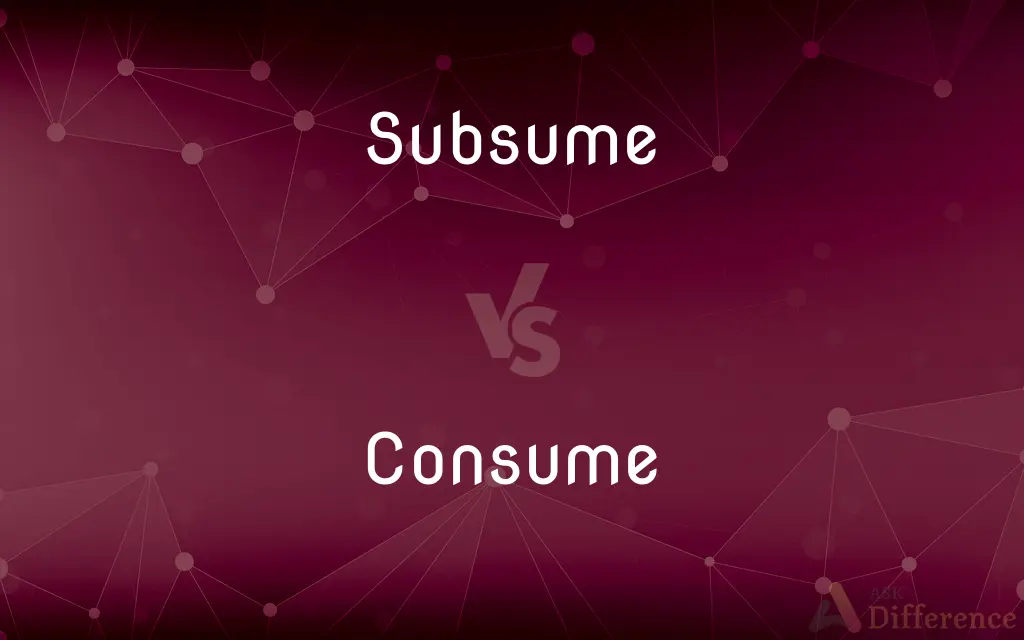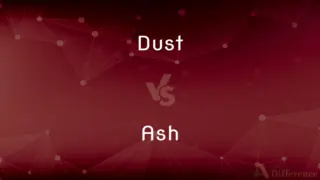Subsume vs. Consume — What's the Difference?
By Maham Liaqat & Urooj Arif — Updated on March 25, 2024
Subsume involves including or absorbing one thing within another, typically as part of a larger category, while consume refers to using up resources or ingesting food.

Difference Between Subsume and Consume
Table of Contents
ADVERTISEMENT
Key Differences
Subsume is primarily used to describe the action of including or considering one thing as part of a larger group or category. For instance, in a classification system, specific cases can be subsumed under broader categories, where the individual characteristics are included within a wider definition or classification. On the other hand, consume is often related to the act of using up resources or ingesting food. It can imply depletion or a reduction of the thing being consumed. Consumption can occur in various contexts, such as the consumption of goods and services in an economy or the biological consumption of food for energy.
Subsume can also be used in a metaphorical sense to indicate that an idea, concept, or phenomenon encompasses or includes another within its scope or under its definition. This does not involve any physical change or depletion but a conceptual or categorical inclusion. Consume, in addition to its physical meanings, can also describe experiences or emotions in an abstract sense. For example, one can be consumed by passion or consumed with jealousy. In these contexts, it denotes being fully engrossed or overwhelmed by these feelings, rather than the literal ingestion or usage of a physical item.
The concept of subsumption does not inherently carry connotations of loss, reduction, or depletion. It is more about organizational or conceptual relationships. In contrast, consumption inherently suggests that something is being used up, diminished, or fully absorbed in a manner that affects its original state or availability.
While both terms deal with the idea of one thing interacting with another, their meanings and applications differ significantly. Subsume is about inclusion within a broader category without implying loss, whereas consume is about using up or being fully engaged with something, often leading to a decrease in its original form or availability.
Comparison Chart
Definition
To include or incorporate within something larger.
To use up, eat, or absorb completely.
ADVERTISEMENT
Context
Often used in abstract, organizational, or conceptual terms.
Primarily used in physical, emotional, or economic contexts.
Connotation
Inclusion without loss or depletion.
Usage that implies reduction or depletion.
Example Usage
Subsuming a concept under a broader theory.
Consuming food or resources.
Metaphorical Sense
Can imply conceptual inclusion.
Can denote being overwhelmed by emotions or experiences.
Compare with Definitions
Subsume
Broadening of scope or application.
Modern interpretations subsume traditional roles in broader contexts.
Consume
Eating or drinking.
She consumed a large meal after the workout.
Subsume
Inclusion within a larger group.
The study subsumes the case under a general principle.
Consume
Causing the depletion or reduction of something.
The fire consumed the entire building within hours.
Subsume
Conceptual or theoretical incorporation.
His latest theory subsumes several older theories into a more unified framework.
Consume
Using resources or energy.
The project consumed a significant amount of time and materials.
Subsume
Absorption without physical alteration.
This category subsumes a wide range of diverse opinions.
Consume
Being fully engaged or absorbed emotionally.
He was consumed by grief after the loss.
Subsume
Organizational or hierarchical structuring.
The new system subsumes all previous processes into a single model.
Consume
Experiencing or undergoing in a comprehensive manner.
Consumed by curiosity, she explored every book on the subject.
Subsume
Include or absorb (something) in something else
Most of these phenomena can be subsumed under two broad categories
Consume
To take in as food; eat or drink up.
Subsume
To classify or include in a more comprehensive category or under a general principle
"When late eighteenth-century Americans spoke of politics, they referred to a broad set of principles that they subsumed under the heading of republicanism" (Eric Foner).
Consume
To expend; use up
Engines that consume less fuel.
A project that consumed most of my time and energy.
Subsume
To absorb (something) into or cause (something) to be overshadowed by something else
"The moment's regret was subsumed in the needs of the next moment" (Diana Gabaldon).
Consume
To purchase (goods or services) for direct use or ownership.
Subsume
To place (any one cognition) under another as belonging to it; to include or contain something else.
Consume
To waste; squander.
Subsume
To consider an occurrence as part of a principle or rule; to colligate
Consume
To destroy totally; ravage
Flames that consumed the house.
A body consumed by cancer.
Subsume
To take up into or under, as individual under species, species under genus, or particular under universal; to place (any one cognition) under another as belonging to it; to include under something else.
To subsume one proposition under another.
A principle under which one might subsume men's most strenuous efforts after righteousness.
Consume
To absorb; engross
Consumed with jealousy.
Subsume
Contain or include;
This new system subsumes the old one
Consume
To purchase economic goods and services
A society that consumes as fast as it produces.
Subsume
Consider (an instance of something) as part of a general rule or principle
Consume
(transitive) To use up.
The power plant consumes 30 tons of coal per hour.
Consume
(transitive) To eat.
Baby birds consume their own weight in food each day.
Consume
(transitive) To completely occupy the thoughts or attention of.
Desire consumed him.
Consume
(transitive) To destroy completely.
The building was consumed by fire.
Consume
To waste away slowly.
Consume
To trade money for good or services as an individual.
In a materialistic society, individuals are taught to consume, consume, consume.
If you consume this product while in Japan, you may be subject to consumption tax.
Consume
(transitive) To absorb information, especially through the mass media.
The Internet has changed the way we consume news.
Consume
To destroy, as by decomposition, dissipation, waste, or fire; to use up; to expend; to waste; to burn up; to eat up; to devour.
If he were putting to my house the brandThat shall consume it.
Lay up for yourselves treasures in heaven, where neither moth nor rust doth consume.
Let me alone . . . that I may consume them.
Consume
To waste away slowly.
Therefore, let Benedick, like covered fire,Consume away in sighs.
Consume
Eat immoderately;
Some people can down a pound of meat in the course of one meal
Consume
Serve oneself to, or consume regularly;
Have another bowl of chicken soup!
I don't take sugar in my coffee
Consume
Spend extravagantly;
Waste not, want not
Consume
Destroy completely;
The fire consumed the building
Consume
Use up (resources or materials);
This car consumes a lot of gas
We exhausted our savings
They run through 20 bottles of wine a week
Consume
Engage fully;
The effort to pass the exam consumed all his energy
Common Curiosities
Can a concept be both subsumed and consumed?
A concept can be subsumed into a broader category conceptually, but it would not be consumed in the same context. Consumption typically refers to a more tangible or emotional engagement.
What does it mean to subsume something?
To subsume something means to include or incorporate it within a larger group or category.
Can ideas or theories be consumed?
Ideas or theories are typically not described as being consumed in a literal sense, but one's time and attention can be consumed by engaging with them.
Is consuming always related to food?
No, consuming can also refer to using up resources, being fully engaged with emotions or experiences, and other non-food related contexts.
How do subsume and consume differ in their application?
Subsume is more about abstract, organizational, or conceptual inclusion, whereas consume often implies a physical or emotional depletion or engagement.
Does consumption always involve physical objects?
No, one can also consume media, experiences, or be consumed by emotions or experiences abstractly.
How does the concept of consumption relate to economics?
In economics, consumption refers to the use of goods and services by households, affecting economic health and growth.
Can subsumption be reversed?
Subsumption is generally a conceptual process and may be reevaluated or restructured, but it's not about physical reversal like disassembling.
How does one determine what subsumes under a category?
Determining what subsumes under a category involves analysis of characteristics, purposes, or functions that align with the broader category's definitions.
Is consuming an experience the same as enjoying it?
Consuming an experience implies engaging with it fully, which may or may not involve enjoyment depending on the context.
What role does subsumption play in categorization?
Subsumption plays a key role in categorization by allowing for the organization of items, ideas, or concepts into broader categories based on shared characteristics.
Can consuming be a passive activity?
Consuming can be both passive and active, depending on the context, such as passively consuming media versus actively consuming food.
What does it mean to be consumed by emotion?
Being consumed by emotion means being fully engrossed or overwhelmed by that emotion, such as love, jealousy, or anger.
Can subsuming lead to a loss of identity for the subsumed item?
Subsuming does not necessarily lead to a loss of identity; it often involves recognizing the subsumed item as part of a larger whole without diminishing its distinctiveness.
Does the process of subsumption change the subsumed entity?
Subsumption doesn't change the inherent characteristics of the subsumed entity; it changes its contextual or conceptual framework.
Share Your Discovery

Previous Comparison
Dust vs. Ash
Next Comparison
Execute vs. RunAuthor Spotlight
Written by
Maham LiaqatCo-written by
Urooj ArifUrooj is a skilled content writer at Ask Difference, known for her exceptional ability to simplify complex topics into engaging and informative content. With a passion for research and a flair for clear, concise writing, she consistently delivers articles that resonate with our diverse audience.
















































